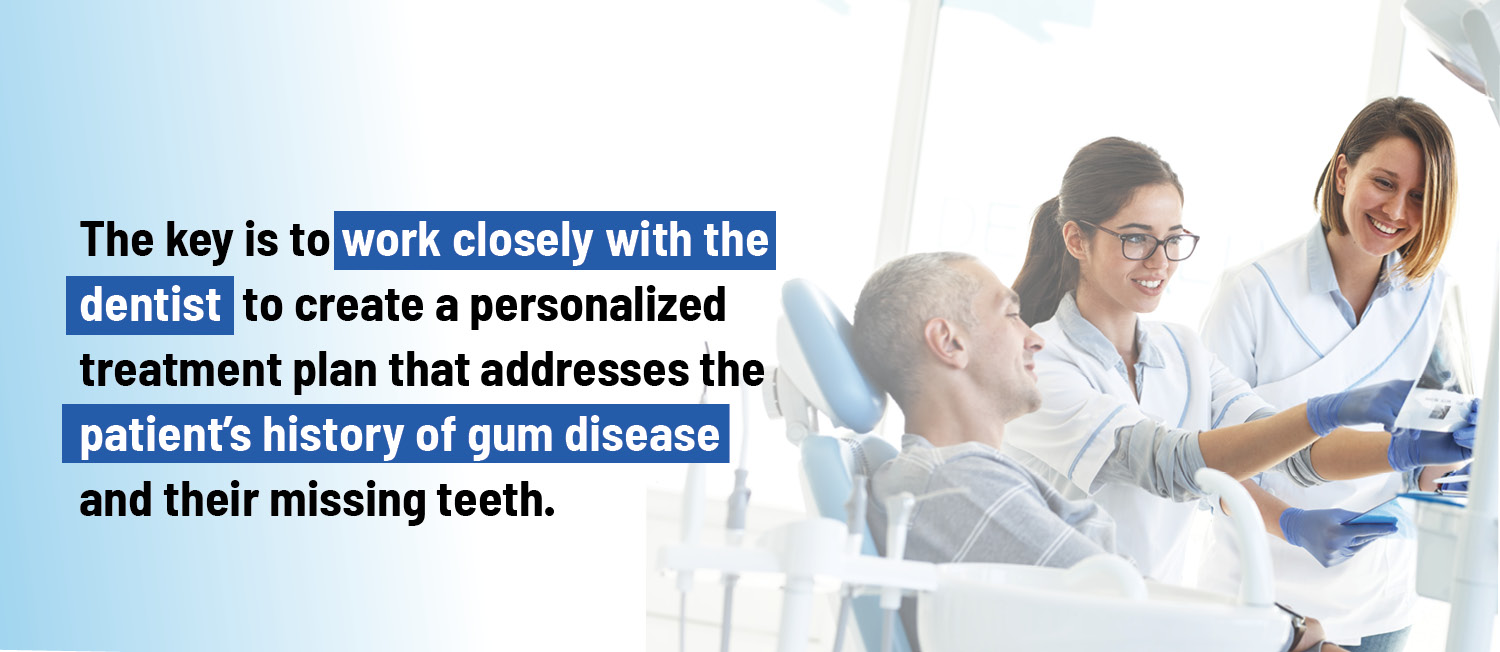Dental implants are one of the best ways to replace missing teeth. They look and function just like natural teeth, making them a popular choice. But what about patients with gum disease? Can they still get dental implants? This is a common question, and the answer is that it depends on a few factors. Patients need to get gum disease under control before getting implants. If this is not possible, there are several alternatives to dental implants that patients can consider.
In all cases, the first step is to consult with a dentist on the best course of action.
How Gum Disease Can Affect Dental Implants
For dental implants to work, they need to be securely placed in the patient’s jawbone. The implant acts like a tooth root, anchoring the replacement tooth in place. Healthy gums and bone tissue are crucial for this process. When a patient has gum disease, their gums may not be healthy enough to support the implant, and bone loss could make it difficult for the implant to take root.
Gum disease, also known as periodontal disease, is an infection of the gums. Gum disease may be caused by plaque buildup on the teeth. If plaque isn’t cleaned off regularly, it hardens into tartar, which can lead to inflammation and infection in the gums. Gum disease can also be the result of smoking, certain medications, or an underlying health condition such as diabetes.
There are two main stages of gum disease:
1. Gingivitis – This is the early stage of gum disease. It involves redness, swelling, and bleeding of the gums. Fortunately, gingivitis is reversible with treatment.
A patient with gingivitis may still be a candidate for dental implants, but it is essential to treat the gum disease first. Gingivitis can often be reversed with good oral hygiene and professional cleanings. Once the gums are healthy again, the dentist can discuss whether the patient can have dental implants.
2. Periodontitis – If gingivitis is not treated effectively, it can progress into periodontitis. This is a more severe form of gum disease that causes the gums to pull away from the teeth, leading to bone loss. Left untreated, it can eventually cause tooth loss.
Treating Gum Disease
Because gum disease is a serious health risk, it must be addressed before considering implants.
Treating periodontitis may involve deep cleaning procedures like scaling and root planing, where the dentist or hygienist cleans below the gum line to remove plaque and tartar. In more severe cases, surgical treatment might be necessary to reduce pocket depth and save the gums and bone from further damage.
Some patients with periodontitis are not able to get dental implants. If the disease has progressed to the point where the patient has lost a lot of bone tissue, it may be difficult to place an implant securely.
In cases of severe bone loss, the dentist might suggest a bone graft to build up the bone in the jaw before even considering dental implants. This procedure adds bone material to the jaw to create a stable foundation for the implant. It is important to note that bone grafting can add time to the dental implant process, as the new bone needs time to heal and integrate with the jawbone.
A patient’s first step should always be a visit to the dentist or periodontist (a dentist who specializes in gum disease). Gum disease is a serious condition that harms more than just a patient’s teeth—it can impact overall health. Left untreated, it can increase the risk for heart disease, diabetes, and other serious conditions.
The dentist can assess the severity of the patient’s gingivitis or periodontitis and determine the best course of treatment.

Can You Get Dental Implants After Gum Disease Treatment?
After a period of healing, it can be possible to get dental implants. If the disease has been caught early and treated properly, there’s a good chance that the patient’s gums and bone will be healthy enough to support an implant.
Even some cases of periodontitis can be reversed. With the right treatment plan, including bone grafts and ongoing periodontal care, many people with a history of gum disease have successfully received dental implants.
The key is to work closely with the dentist to create a personalized treatment plan that addresses the patient’s history of gum disease and their missing teeth.
Alternatives to Dental Implants
If a patient’s gum disease is too advanced and dental implants are not an option, there are other ways to replace missing teeth. Some alternatives to dental implants include:
- Dental bridges – A dental bridge is a fixed prosthetic that “bridges” the gap between missing teeth. It is supported by the teeth on either side of the gap.
While traditional bridges involve using crowns placed on the teeth in front of and behind the missing tooth or teeth, a special type of bridge called a Maryland bridge is instead bonded to adjacent teeth with a strong resin. Maryland bridges only require one natural tooth for bonding and are less invasive than traditional bridges.
Bridges can be a good alternative to implants for patients experiencing bone loss. However, both traditional and Maryland dental bridges still require the surrounding teeth and gums to be healthy.
- Dentures – Dentures are removable prosthetic teeth that rest on the gums. Full dentures replace an entire upper arch, lower arch, or both. While dentures do not offer the same stability as implants, they are a tried-and-true solution for many people and can be a good fit for patients with a history of gum disease.
- Partial dentures – If only a few teeth are missing, partial dentures may be a good option. Like full dentures, they are removable, but they only replace the teeth that are missing.
In some cases, the dentist may recommend a temporary solution like a partial denture or Maryland bridge while in treatment for gum disease. Once the gums are healthier, the patient may be able to reconsider dental implants or other permanent options.
The Importance of Consulting with a Dentist
Whether you are considering dental implants or an alternative, the most important thing you can do is consult with a dentist. They can develop a plan to address both your gum disease and missing teeth, whether through implants or other solutions.
Get started improving the health of your smile today: use our online appointment tool to find a dentist in your area.


